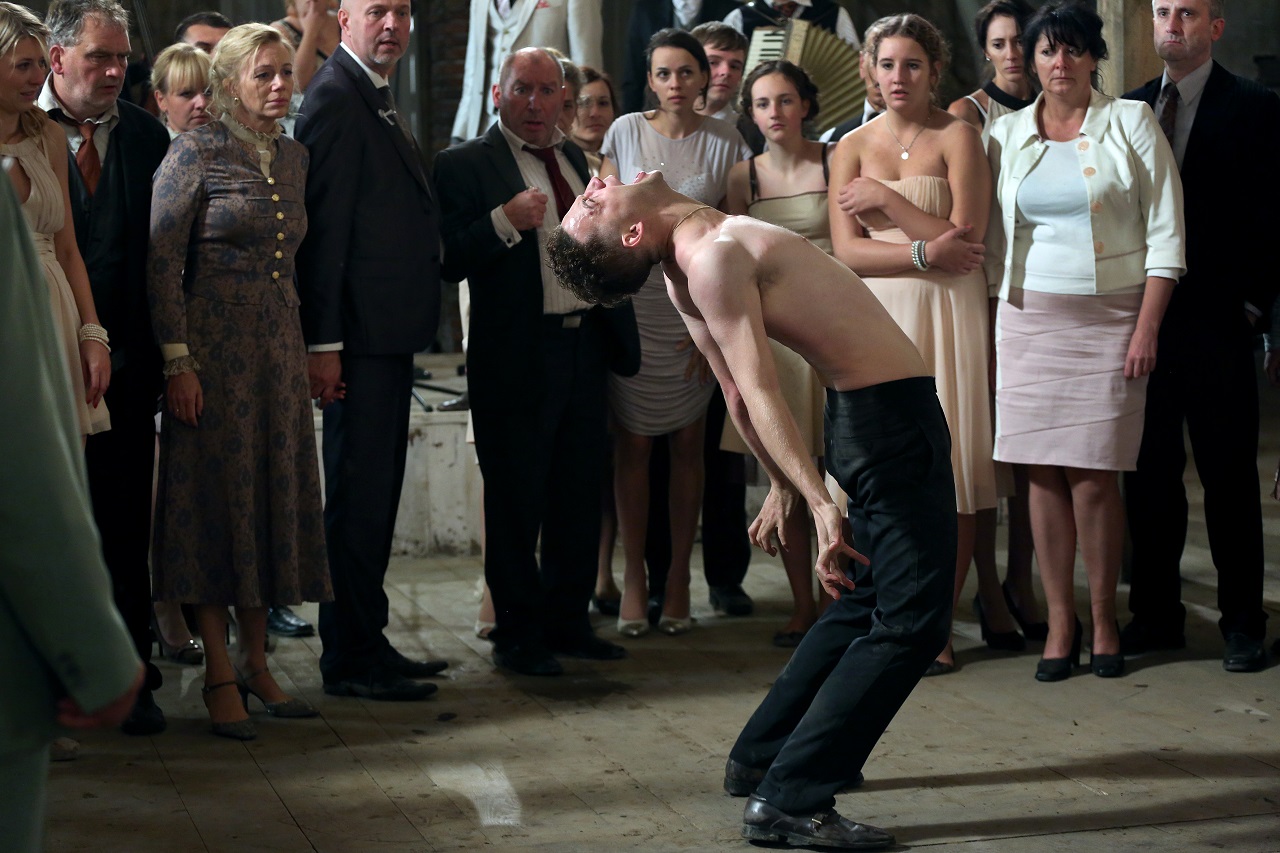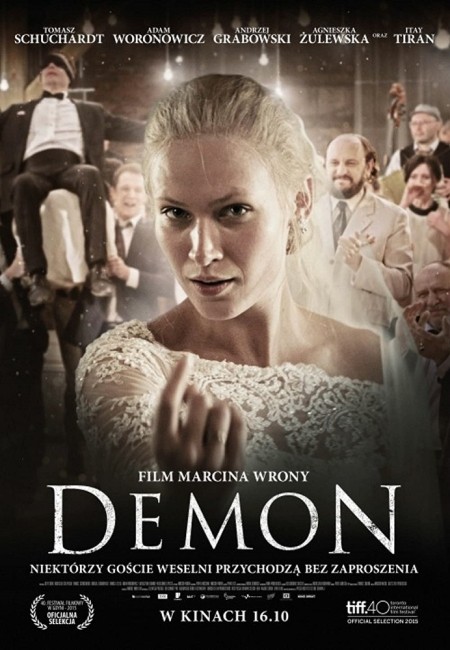Crew
Director – Marcin Wrona, Screenplay – Pawel Mislona & Marcin Wrona, Based on the Play Clinging by Piotr Rowicki, Photography – Pawel Flis, Music – Marcin Macuk & Krysztof Pendericki, Production Design – Anna Wunderlich. Production Company – Magnet Man Film Ltd/Telewizja Polska S.A./Chimney Poland/Transfax Film Productions/Lava Films/Krakow Festival Office/Silesia Film/Wajda Studio Sp.
Cast
Itay Tiran (Python/Piotr), Agnieszka Zulewska (Zanieta), Andrzej Grabowski (Zygmunt), Tomasz Schuchardt (Jasny), Adam Woronowicz (Doctor), Wlodzimierz Press (Szymon Wentz), Tomasz Zietek (Ronaldo), Cezary Kosinski (Preacher), Katarzyna Gniewkowska (Zofia), Maria Debska (Hana)
Plot
Python plans to marry Zanieta and asks Zygmunt, his father-in-law to be, if they can move into the old family home. During the efforts to build a swimming pool, Python uncovers a buried skeleton. He then starts to have dreams and nightmares of a girl. As the wedding day arrives, Python begins to behave increasingly erratically, eventually going into convulsions on the dancefloor. Zygmunt is eager to have the wedding continue as normal. However, as the doctor, the priest and the aging Jewish man who are all in attendance, examine Python in the cellar, it becomes apparent that he is possessed by a dybbuk – the spirit of a Jewish girl who was killed during World War II.
Demon was the third and final film for Polish director Marcin Wrona. Wrona had previously appeared with My Flesh, My Blood (2009) and The Christening (2010), both non-genre films, as well as some tv work. Demon came out of Wrona’s fascination with modern Poland’s relationship to The Holocaust and his father who used to work as an exorcist. Demon premiered at the Toronto International Film Festival. Wrona, who was apparently highly competitive, became depressed when the film screened at a festival in the Polish seaside town of Gdynia but was overlooked in favour of other works whereupon he hung himself in his hotel room. He was only aged 42.
The title says it all upfront – there is hardly any more direct a way you could refer to a film about possession than calling it ‘demon’. This leads you to certain expectations before you sit down and watch it. These also are expectations that Marcin Wrona ends up considerably undercutting. One of the most glaring of these is that despite the title ‘Demon’, the film does not actually feature any demons. It does feature a dybbuk, which, according to Jewish folklore, is the disembodied soul of a dead person.
Of course, the other expectation that a film titled Demon gives you is part and parcel of the whole exorcism and demonic theatrics sideshow that has taken over the genre since The Exorcist (1973) – the head-turnings, vomitings, people mouthing obscenities and taunting others with personal information, the levitations, the cracked and sore-ridden faces, the priests standing over chanting “the power of Chris compels you” and so on. (For a more detailed overview of the genre see my essay Possession Films).
Marcin Wrona concerns himself with none of that. At most, Itay Tiran goes into convulsions during the middle of the wedding dance and is shuffled away to the cellar where he proceeds to talk in foreign languages and a girl’s voice. There is a priest present, as well as a doctor and an aging Jewish man who specifically states that he does not have enough knowledge to be a rabbi, and all seem to have a different opinion about what is going on.

Demon is a film about possession that is remarkably free of the usual horror cliches and claptrap about possession and exorcism. Instead, Marcin Wrona makes it a film centred around a situation – the wedding – and how Itay Tiran’s increasingly strange behaviour upsets what is going on. He is locked in the cellar but less for the usual reasons of chaining the demon up than simply that the father-in-law (Andrzej Grabowski) wants to sweep under the rug the embarrassment that his behaviour presents in front of the gathered guests. Much of the middle of the film is taken up not by an exorcism but by the sometimes comical interactions between various guests.
This leads to the striking ending. Where a standard Western possession and exorcism film climaxes in a furious battle for the soul of the person inside the possessed body, Demon simply has Itay Tiran escape from the cellar – we don’t even know where he ends up going after that point despite a manhunt instituted for him, or what his eventual fate is. Rather Marcin Wrona is fascinated with what the possession represents – namely the dead of the Holocaust coming back to haunt modern Poles.
In a truly remarkable ending, father-in-law Grabowski stands up before the wedding party and makes a speech suggesting that what they saw didn’t happen, that it was a collective illusion. The end of the film shows bulldozers demolishing the house and barn where the wedding took place. In other words, this is Marcin Wrona tackling the collective denial that modern Poland seems to have about the Holocaust – the rejection that they were party to handing the Jews over to the Nazis to be slaughtered, the erasing of this past and even demolishing of many of the Jewish ghettos. The buried guilt, Wrona seems to be saying, lurks and continues to haunt the modern world.

